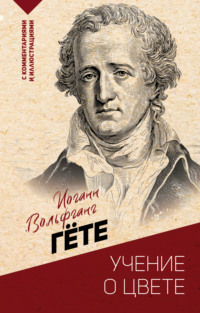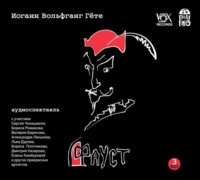 полная версия
полная версияWilhelm Meister's Apprenticeship and Travels, Vol. I (of 2)
So potent a spice was certainly required to render tolerable, nay, at last agreeable, the state in which he usually found her chamber, not to say herself.
Brought up in a substantial burgher's house, cleanliness and order were the elements in which he breathed; and, inheriting as he did a portion of his father's taste for finery, it had always been his care, in boyhood, to furbish up his chamber, which he regarded as his little kingdom, in the stateliest fashion. His bed-curtains were drawn together in large, massy folds, and fastened with tassels, as they are usually seen in thrones; he had got himself a carpet for the middle of his chamber, and a finer one for his table; his books and apparatus he had, almost instinctively, arranged in such a manner, that a Dutch painter might have imitated them for groups in his still-life scenes. He had a white cap, which he wore straight up like a turban; and the sleeves of his night-gown he had caused to be cut short, in the mode of the Orientals. By way of reason for this, he pretended that long, wide sleeves encumbered him in writing. When, at night, the boy was quite alone, and no longer dreaded any interruption, he usually wore a silk sash tied round his body; and often, it is said, he would fix in his girdle a sword, which he had appropriated from an old armory, and thus repeat and declaim his tragic parts; nay, in the same trim he would kneel down and say his evening prayer.
In those times, how happy did he think the players, whom he saw possessed of so many splendid garments, trappings, and arms; and in the constant practice of a lofty demeanor, the spirit of which seemed to hold up a mirror of whatever, in the opinions, relations, and passions of men, was stateliest and most magnificent. Of a piece with this, thought Wilhelm, is also the player's domestic life, – a series of dignified transactions and employments, whereof their appearance on the stage is but the outmost portion; like as a mass of silver, long simmering about in the purifying furnace, at length gleams with a bright and beautiful tinge in the eye of the refiner, and shows him, at the same time, that the metal now is cleansed of all foreign mixture.
Great, accordingly, was his surprise at first, when he found himself beside his mistress, and looked down, through the cloud that environed him, on tables, stools, and floor. The wrecks of a transient, light, and false decoration lay, like the glittering coat of a skinned fish, dispersed in wild disorder. The implements of personal cleanliness, – combs, soap, towels, – with the traces of their use, were not concealed. Music, portions of plays and pairs of shoes, washes and Italian flowers, pin-cushions, hair-skewers, rouge-pots, and ribbons, books and straw hats, – no article despised the neighborhood of another: all were united by a common element, – powder and dust. Yet as Wilhelm scarcely noticed in her presence aught except herself; nay, as all that had belonged to her, that she had touched, was dear to him, – he came at last to feel, in this chaotic housekeeping, a charm which the proud pomp of his own habitation never had communicated. When, on this hand, he lifted aside her bodice, to get at the harpsichord; on that, threw her gown upon the bed, that he might find a seat; when she herself, with careless freedom, did not seek to hide from him many a natural office, which, out of respect for the presence of a second person, is usually concealed, – he felt as if by all this he was coming nearer to her every moment, as if the communion betwixt them was fastening by invisible ties.
It was not so easy to reconcile with his previous ideas the behavior of the other players, whom, on his first visits, he often met with in her house. Ever busied in being idle, they seemed to think least of all on their employment and object: the poetic worth of a piece they were never heard to speak of, or to judge of, right or wrong; their continual question was simply, How much will it bring? Is it a stock-piece? How long will it run? How often think you it may be played? and other inquiries and observations of the same description. Then commonly they broke out against the manager, that he was stinted with his salaries, and especially unjust to this one or to that; then against the public, how seldom it recompensed the right man with its approval, how the German theatre was daily improving, how the player was ever growing more honored, and never could be honored enough. Then they would descant largely about wine-gardens and coffee-houses; how much debt one of their comrades had contracted, and must suffer a deduction from his wages on account of; about the disproportion of their weekly salaries; about the cabals of some rival company: on which occasions, they would pass again to the great and merited attention which the public now bestowed upon them; not forgetting the importance of the theatre to the improvement of the nation and the world.
All this, which had already given Wilhelm many a restless hour, came again into his memory, as he walked his horse slowly homewards, and contemplated the various occurrences in which he had so lately been engaged. The commotion produced by a girl's elopement, not only in a decent family, but in a whole town, he had seen with his own eyes; the scenes upon the highway and in the Amthaus, the views entertained by Melina, and whatever else he had witnessed, again arose before him, and brought his keen, forecasting mind into a sort of anxious disquietude; which no longer to endure, he struck the spurs into his horse, and hastened towards home.
By this expedient, however, he but ran to meet new vexations. Werner, his friend and future brother-in-law, was waiting for him, to begin a serious, important, unexpected conversation.
Werner was one of those tried, sedate persons, with fixed principles and habits, whom we usually denominate cold characters, because on emergencies they do not burst forth quickly or very visibly. Accordingly, his intercourse with Wilhelm was a perpetual contest; which, however, only served to knit their mutual affection the more firmly; for, notwithstanding their very opposite modes of thinking, each found his account in communicating with the other. Werner was very well contented with himself, that he could now and then lay a bridle on the exalted but commonly extravagant spirit of his friend; and Wilhelm often felt a glorious triumph, when the staid and thinking Werner could be hurried on with him in warm ebullience. Thus each exercised himself upon the other; they had been accustomed to see each other daily; and you would have said, their eagerness to meet and talk together had even been augmented by the inability of each to understand the other. At bottom, however, being both good-hearted men, they were both travelling together towards one goal; and they could never understand how it was that neither of the two could bring the other over to his own persuasion.
For some time Werner had observed that Wilhelm's visits had been rarer; that in his favorite discussions he was brief and absent-minded; that he no longer abandoned himself to the vivid depicting of singular conceptions, – tokens by which, in truth, a mind getting rest and contentment in the presence of a friend is most clearly indicated. The considerate and punctual Werner first sought for the root of the evil in his own conduct; till some rumors of the neighborhood set him on the proper trace, and some unguarded proceedings on the part of Wilhelm brought him nearer to the certainty. He began his investigation, and erelong discovered, that for some time Wilhelm had been openly visiting an actress, had often spoken with her at the theatre, and accompanied her home. On discovering the nightly visits of his friend, Werner's anxiety increased to a painful extent: for he heard that Mariana was a most seductive girl, who probably was draining the youth of his money; while, at the same time, she herself was supported by another and a very worthless lover.
Having pushed his suspicions as near certainty as possible, he had resolved to make a sharp attack on Wilhelm: he was now in full readiness with all his preparations, when his friend returned, discontented and unsettled, from his journey.
That very evening Werner laid the whole of what he knew before him, first calmly, then with the emphatic earnestness of a well-meaning friendship. He left no point of the subject undiscussed, and made Wilhelm taste abundance of those bitter things which men at ease are accustomed, with virtuous spite, to dispense so liberally to men in love. Yet, as might have been expected, he accomplished little. Wilhelm answered with interior commotion, though with great confidence, "You know not the girl! Appearances, perhaps, are not to her advantage; but I am certain of her faithfulness and virtue, as of my love."
Werner maintained his accusations, and offered to bring proofs and witnesses. Wilhelm waived these offers, and parted with his friend out of humor and unhinged, like a man in whose jaw some unskilful dentist has been seizing a diseased, yet fast-rooted, tooth, and tugging at it harshly to no purpose.
It exceedingly dissatisfied Wilhelm to see the fair image of Mariana overclouded and almost deformed in his soul, first by the capricious fancies of his journey, and then by the unfriendliness of Werner. He adopted the surest means of restoring it to complete brilliancy and beauty, by setting out at night, and hastening to his wonted destination. She received him with extreme joy: on entering the town, he had ridden past her window; she had been expecting his company; and it is easy to conceive that all scruples were soon driven from his heart. Nay, her tenderness again opened up the whole stores of his confidence; and he told her how deeply the public, how deeply his friend, had sinned against her.
Much lively talking led them at length to speak about the earliest period of their acquaintance, the recollection of which forms always one of the most delightful topics between two lovers. The first steps that introduce us to the enchanted garden of love are so full of pleasure, the first prospects so charming, that every one is willing to recall them to his memory. Each party seeks a preference above the other; each has loved sooner, more devotedly; and each, in this contest, would rather be conquered than conquer.
Wilhelm repeated to his mistress, what he had so often told her before, how she soon abstracted his attention from the play, and fixed it on herself; how her form, her acting, her voice, inspired him; how at last he went only on the nights when she was to appear; how, in fine, having ventured behind the scenes, he had often stood by her unheeded; and he spoke with rapture of the happy evening when he found an opportunity to do her some civility, and lead her into conversation.
Mariana, on the other hand, would not allow that she had failed so long to notice him: she declared that she had seen him in the public walk, and for proof she described the clothes which he wore on that occasion; she affirmed that even then he pleased her before all others, and made her long for his acquaintance.
How gladly did Wilhelm credit all this! How gladly did he catch at the persuasion, that, when he used to approach her, she had felt herself drawn towards him by some resistless influence; that she had gone with him between the side-scenes on purpose to see him more closely, and get acquainted with him; and that, in fine, when his backwardness and modesty were not to be conquered, she had herself afforded him an opportunity, and, as it were, compelled him to hand her a glass of lemonade.
In this affectionate contest, which they pursued through all the little circumstances of their brief romance, the hours passed rapidly away; and Wilhelm left his mistress with his heart at peace, and firmly determined on proceeding forthwith to the execution of his project.
CHAPTER XVI
The necessary preparations for his journey his father and mother had attended to: some little matters, that were yet wanting to his equipage, delayed his departure for a few days. Wilhelm took advantage of this opportunity to write to Mariana, meaning thus to bring to a decision the proposal, about which she had hitherto avoided speaking with him. The letter was as follows: —
"Under the kind veil of night, which has often over-shadowed us together, I sit and think, and write to thee: all that I meditate and do is solely on thy account. O Mariana! with me, the happiest of men, it is as with a bridegroom who stands in the festive chamber, dreaming of the new universe that is to be unfolded to him, and by means of him, and, while the holy ceremonies are proceeding, transports himself in longing thought before the mysterious curtains, from which the loveliness of love whispers out to him.
"I have constrained myself not to see thee for a few days: the sacrifice was easy, when united with the hope of such a recompense, of being always with thee, of remaining ever thine! Need I repeat what I desire? I must! for it seems as if yet thou hadst never understood me.
"How often, in the low tones of true love, which, though wishing to gain all, dares speak but little, have I sought in thy heart for the desire of a perpetual union. Thou hast understood me, doubtless; for in thy own heart the same wish must have arisen: thou didst comprehend me, in that kiss, in the intoxicating peace of that happy evening. Thy silence testified to me thy modest honor; and how did it increase my love! Another woman would have had recourse to artifice, that she might ripen by superfluous sunshine the purpose of her lover's heart, might elicit a proposal, and secure a firm promise. Mariana, on the contrary, drew back: she repelled the half-opened confidence of him she loved, and sought to conceal her approving feelings by apparent indifference. But I have understood thee! What a miserable creature must I be, if I did not by these tokens recognize the pure and generous love that cares not for itself, but for its object! Confide in me, and fear nothing. We belong to one another; and neither of us leaves aught or forsakes aught, if we live for one another.
"Take it, then, this hand! Solemnly I offer this unnecessary pledge! All the joys of love we have already felt, but there is a new blessedness in the firm thought of duration. Ask not how, – care not. Fate takes care of love, and the more certainly as love is easy to provide for.
"My heart has long ago forsaken my paternal home: it is with thee, as my spirit hovers on the stage. O my darling! to what other man has it been given to unite all his wishes, as it is to me? No sleep falls upon my eyes: like the redness of an everlasting dawn, thy love and thy happiness still glow around me.
"Scarcely can I hold myself from springing up, from rushing forth to thee, and forcing thy consent, and, with the first light of to-morrow, pressing forward into the world for the mark I aim at. But, no! I will restrain myself; I will not act like a thoughtless fool, will do nothing rashly: my plan is laid, and I will execute it calmly.
"I am acquainted with the manager Serlo: my journey leads me directly to the place where he is. For above a year he has frequently been wishing that his people had a touch of my vivacity, and my delight in theatrical affairs: I shall doubtless be very kindly received. Into your company I cannot enter, for more than one reason. Serlo's theatre, moreover, is at such a distance from this, that I may there begin my undertaking without any apprehension of discovery. With him I shall thus at once find a tolerable maintenance: I shall look about me in the public, get acquainted with the company, and then come back for thee.
"Mariana, thou seest what I can force myself to do, that I may certainly obtain thee. For such a period not to see thee; for such a period to know thee in the wide world! I dare not view it closely. But yet if I recall to memory thy love, which assures me of all; if thou shalt not disdain my prayer, and give me, ere we part, thy hand, before the priest, – I may then depart in peace. It is but a form between us, yet a form so touching, – the blessing of Heaven to the blessing of the earth. Close by thy house, in the Ritterschaftliche Chapel, the ceremony will be soon and secretly performed.
"For the beginning I have gold enough; we will share it between us; it will suffice for both; and, before that is finished, Heaven will send us more.
"No, my darling, I am not downcast about the issue. What is begun with so much cheerfulness must reach a happy end. I have never doubted that a man may force his way through the world, if he really is in earnest about it; and I feel strength enough within me to provide a liberal support for two, and many more. The world, we are often told, is unthankful: I have never yet discovered that it was unthankful, if one knew how, in the proper way, to do it service. My whole soul burns at the idea, that I shall at length step forth, and speak to the hearts of men something they have long been yearning to hear. How many thousand times has a feeling of disgust passed through me, alive as I am to the nobleness of the stage, when I have seen the poorest creatures fancying they could speak a word of power to the hearts of the people! The tone of a man's voice singing treble sounds far pleasanter and purer to my ear: it is incredible how these blockheads, in their coarse ineptitude, deform things beautiful and venerable.
"The theatre has often been at variance with the pulpit: they ought not, I think, to quarrel. How much is it to be wished, that in both the celebration of nature and of God were intrusted to none but men of noble minds! These are no dreams, my darling! As I have felt in thy heart that thou couldst love, I seize the dazzling thought, and say, – no, I will not say, but I will hope and trust, – that we two shall yet appear to men as a pair of chosen spirits, to unlock their hearts, to touch the recesses of their nature, and prepare for them celestial joys, as surely as the joys I have tasted with thee deserved to be named celestial, since they drew us from ourselves, and exalted us above ourselves.
"I cannot end. I have already said too much, and know not whether I have yet said all, all that concerns thy interests; for to express the agitations of the vortex that whirls round within myself, is beyond the power of words.
"Yet take this sheet, my love! I have again read it over: I observe it ought to have begun more cautiously; but it contains in it all that thou hast need to know, – enough to prepare thee for the hour when I shall return with the lightness of love to thy bosom. I seem to myself like a prisoner that is secretly filing his irons asunder. I bid good-night to my soundly sleeping parents. Farewell, my beloved, farewell! For this time I conclude; my eyelids have more than once dropped together; it is now deep in the night."
CHAPTER XVII
It seemed as if the day would never end, while Wilhelm, with the letter beautifully folded in his pocket, longed to meet with Mariana. The darkness had scarcely come on, when, contrary to custom, he glided forth to her house. His plan was, to announce himself for the night; then to quit his mistress for a short time, leaving the letter with her ere he went away; and, returning at a late hour, to obtain her reply, her consent, or to force it from her by the power of his caresses. He flew into her arms, and pressed her in rapture to his bosom. The vehemence of his emotions prevented him at first from noticing, that, on this occasion, she did not receive him with her wonted heartiness; yet she could not long conceal her painful situation, but imputed it to slight indisposition. She complained of a headache, and would not by any means consent to his proposal of coming back that night. Suspecting nothing wrong, he ceased to urge her, but felt that this was not the moment for delivering his letter. He retained it, therefore; and, as several of her movements and observations courteously compelled him to take his leave, in the tumult of unsatiable love he snatched up one of her neckerchiefs, squeezed it into his pocket, and forced himself away from her lips and her door. He returned home, but could not rest there: he again dressed himself, and went out into the open air.
After walking up and down several streets, he was accosted by a stranger inquiring for a certain inn. Wilhelm offered to conduct him to the house. In the way, his new acquaintance asked about the names of the streets, the owners of various extensive edifices, then about some police regulations of the town; so that, by the time they reached the door of the inn, they had fallen into quite an interesting conversation. The stranger politely compelled his guide to enter, and drink a glass of punch with him. Ere long he had told his name and place of abode, as well as the business that had brought him hither; and he seemed to expect a like confidence from Wilhelm. Our friend, without any hesitation, mentioned his name, and the place where he lived.
"Are you not a grandson of the old Meister, who possessed that beautiful collection of pictures and statues?" inquired the stranger.
"Yes, I am. I was ten years old when my grandfather died, and it grieved me very much to see these fine things sold."
"Your father got a fine sum of money for them."
"You know of it, then?"
"Yes, indeed: I saw that treasure ere it left your house. Your grandfather was not merely a collector, he had a thorough knowledge of art. In his younger happy years he had been in Italy, and had brought back with him such treasures as could not now be got for any price. He possessed some exquisite pictures by the best masters. When you looked through his drawings, you would scarcely have believed your eyes. Among his marbles were some invaluable fragments; his series of bronzes was instructive and well chosen; he had also collected medals, in considerable quantity, relating to history and art; his few gems deserved the greatest praise. In addition to all which, the whole was tastefully arranged; although the rooms and hall of the old house had not been symmetrically built."
"You may conceive," said Wilhelm, "what we young ones lost, when all these articles were taken down and sent away. It was the first mournful period of my life. I cannot tell you how empty the chambers looked when we saw those objects vanish one by one, which had amused us from our earliest years, and which we considered as unalterable as the house, or the town itself."
"If I mistake not, your father put the capital produced by the sale into some neighbor's stock, with whom he commenced a sort of partnership in trade."
"Quite right; and their joint speculations have prospered in their hands. Within the last twelve years, they have greatly increased their fortunes, and are now the more vehemently bent on gaining. Old Werner also has a son, who suits that sort of occupation much better than I."
"I am sorry the place should have lost such an ornament as your grandfather's cabinet was to it. I saw it but a short time prior to the sale; and I may say, I was myself the cause of its being then disposed of. A rich nobleman, a great amateur, but one who, in such important transactions, does not trust to his own solitary judgment, had sent me hither, and requested my advice. For six days I examined the collection: on the seventh, I advised my friend to pay down the required sum without delay. You were then a lively boy, often running about me: you explained to me the subjects of the pictures, and in general, I recollect, could give a very good account of the whole cabinet."
"I remember such a person, but I should not have recognized him in you."
"It is a good while ago, and we all change more or less. You had, if I mistake not, a favorite piece among them, to which you were ever calling my attention."
"Oh, yes! it represented the history of that king's son dying of a secret love for his father's bride."
"It was not, certainly, the best picture, – badly grouped, of no superiority in coloring, and executed altogether with great mannerism."
"This I did not understand, and do not yet: it is the subject that charms me in a picture, not the art."
"Your grandfather seemed to have thought otherwise. The greater part of his collection consisted of excellent pieces; in which, represent what they might, one constantly admired the talent of the master. This picture of yours had accordingly been hung in the outermost room, – a proof that he valued it slightly."









